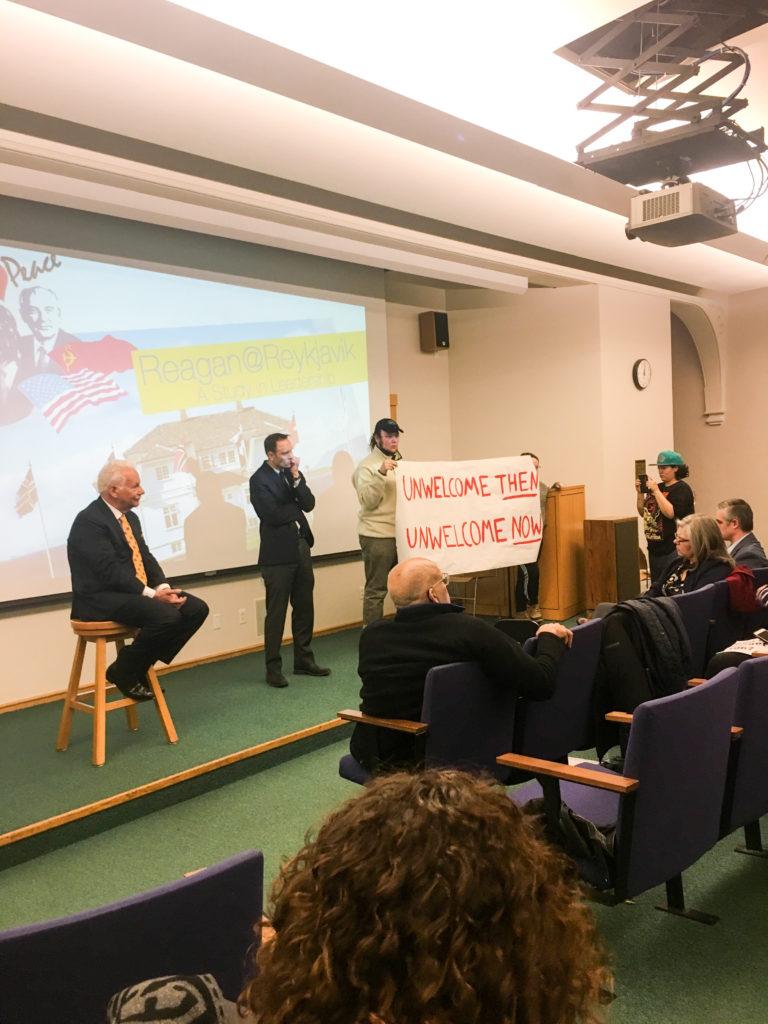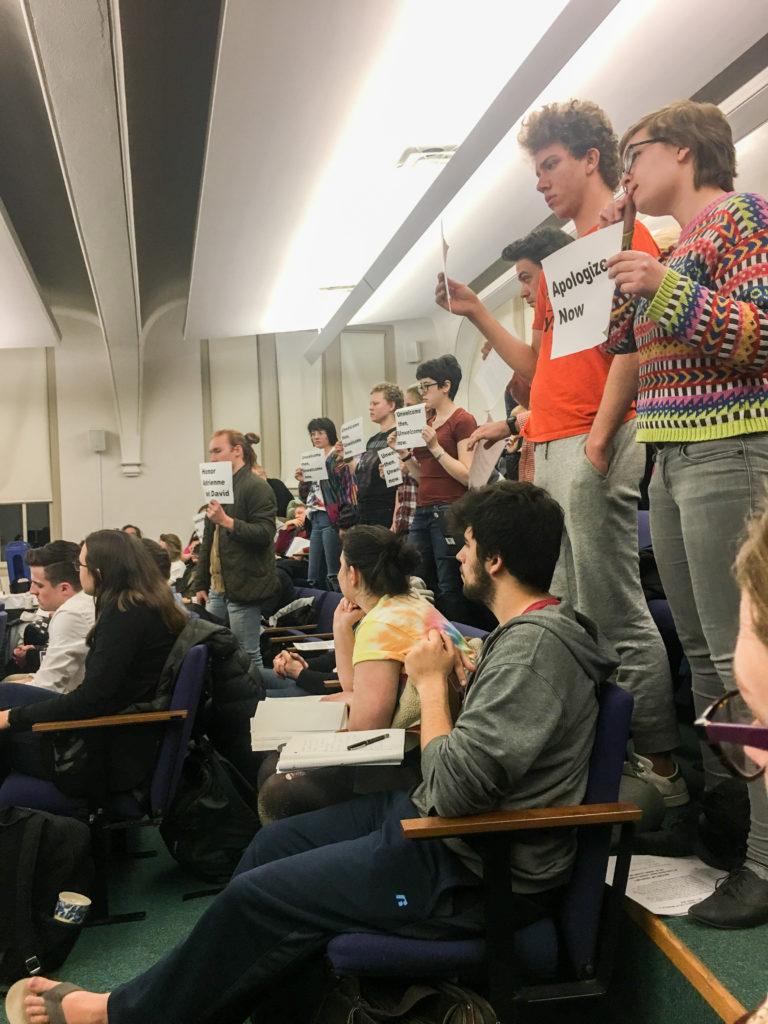
Kenneth Adelman ’67, who has served as Assistant to the US Secretary of Defense under Gerald Ford, US Ambassador to the United Nations and Director of the US Arms Control and Disarmament Agency for the Reagan Administration, spoke about the Reykjavic Summit on Thursday. Adelman also met with students in the Grille the day before as part of the Program in Practical Political Education, where students first raised questions about Adelman’s time at Grinnell.
In the last months of his senior year at Grinnell, Adelman and four other students were disciplined by the College for their involvement in the harassment of two students during the annual “Spring Riot,” a tradition that was discontinued after the incident in which Adelman was implicated.
On April 22, 1967, the victims of the harassment — Adrienne Lemmons ‘68 and David Dillon ‘67 — wrote a letter to the editor in The Grinnell Reporter, a newspaper which temporarily replaced The Scarlet and Black, describing the incident:
“Going to [our] room in Cowles after dinner, we were continually harassed, bombarded with water balloons, and virtually driven from the hall. In the process, the room was invaded by force, while Adrienne was later grazed by an egg thrown at her inside the ladies’ restroom.”
The letter continued, describing an interaction in which Lemmons and Dillon attempted to enter Dillon’s room and were prevented from doing so by the group of five assailants.
“Five or six guys, led by Adelman and supported by ‘Brow’ [a nickname of another student] forced their way into the room, despite the efforts of both Adrienne and David to resist them at the door.”
After the alleged assailants vacated the room, Lemmons wrote that “A mixture of water and beer flowed into the room from a wastebasket which had been filled and then overturned outside the door.”
The student judicial body, “the Interim Student Court,” found the five accused men responsible of “psychological and physical brutalization,” and noted that the incident was not an isolated one and that Dillon had been subject to two years of harassment.
The Court recommended to expel one of the students — James “Jim” Stuart — and to “socially expel” the rest, meaning they were not welcome on campus even to take exams but were permitted to graduate. The Faculty Committee on Student Affairs upheld the decision, and Adelman was banned from the College for the remainder of the semester.
Michael Dejoie ‘67, who served on the Student Interim Court that presided over the 1967 case, said that he did not know if the incident was racially motivated given that Lemmons is black, but that it represented one of many instances of harassment towards David Dillon.
“I do know that they picked on David Dillon a lot. His girlfriend was black, but David was blind — and that group of guys harassed anyone who was different. They called him ‘Bat’,” said Dejoie. The 1967 letter to the editor by Dillon and Lemmons quotes the attackers using the slur “Bat,” as well. [Editor’s Note: There have been differing accounts of Dillon’s visual impairment—some say he was blind, others say he was severely visually impaired].
On Wednesday of this week, Adelman rejected the indictment in the 1967 letter to the editor, and said that the attack had not consisted of “psychological and physical brutalization,” the term the Interim Court used to describe the incident.
“It was a water balloon. I don’t know if I hit anyone with a water balloon, but I said I was guilty, that I was terribly sorry for throwing water balloons, and that — you know — it was a stupid thing to do, but it was Spring Riot,” Adelman said.
In a 1967 statement penned by Adelman and addressed to the victims of the harassment, however, he described the actions of the students implicated in the incident as “disgraceful,” and wrote: “You two will certainly get over the events before we do, for we have ourselves always present.”

On Thursday, Adelman delivered a talk on his work in the Reagan administration as planned. Sandy Barnard ’17, one of approximately 20 students who protested the event, said that “the College made it clear what [Grinnell and Adelman’s] relationship was when they voted to expel him and the fact that he’s allowed back, the fact that we’re able to just forget about the things that he’s done just because he’s politically sexy … is absurd.”
Barnard was joined by other students who held six-by-four foot banners that read “Unwelcome then, Unwelcome now,” and “Adelman harassed an interracial couple @ Grinnell in ’67,” sat in the audience among faculty, students and alumni attending the talk.
After a brief Q&A in which Adelman again refused to acknowledge the brutality of his actions, student protesters shouted, “you’re not welcome here, hate is not welcome here,” and Adelman was ushered from the room.
It is unclear at this point how much current administrators knew about the 1967 incident before Adelman was invited to speak this past week. And although Adelman may be unwelcome in the eyes of some, the College has yet to release a statement regarding the nature of Adelman’s future relationship with the school.




































































Mary '69 • Mar 4, 2017 at 8:51 am
Here’s to the students and shame to the administration. I remember Adelman — didn’t know him — but we all knew what he did. It was horrible, then, and no less so with the passage of time. What was the point of having him back — to feed his abundant ego, which (judging from his unwillingness to address the issue and even to offer a mature and heartfelt apology) is as full now as it was in the 1960s